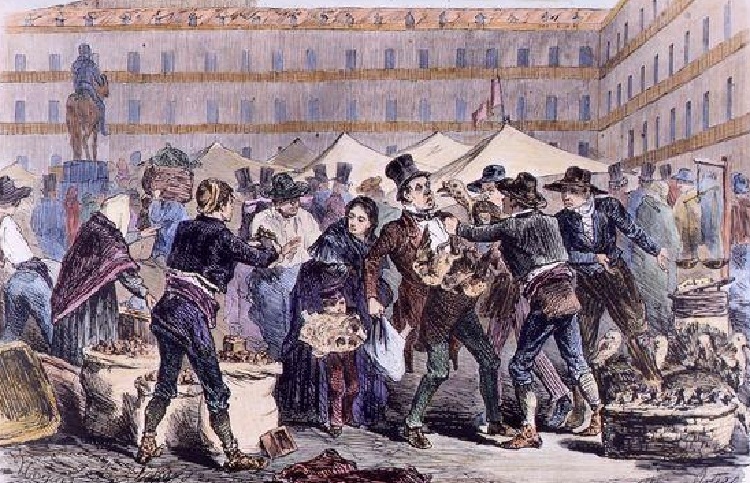Miguel Ángel Vecino
De l’École Pratique des Hautes Études (Sorbonne-Panthéon) / Member of the Commission of History of International Relations / Member ot the Association d’Études du Sud-Est européen.
When Pablo Iglesias listed the Ministries he required from the PSOE in order to form a government – which by the way, had never been asked of him – as a historian, I recalled the ministries claimed by the Communists between 1945 – 1948. This was during the coalition governments with the bourgeois political parties, in post-war Eastern Europe.
Stalin had strategically foreseen a move based on his, almost, thirty million soldiers army; on the occupation of Eastern Europe; and on the ententes with Churchill. In those circumstances, the ministries claimed by the communists were the result of a logical approach during the war and internal subversion periods, when they were preparing their coups d’état in Eastern Europe.
First, Defense, to support the occupation armies of the Soviet Union and oppose any attempt of anti-communist upheaval. The Interior minister, to control and eliminate enemies of the people. The Home Justice was crucial in order to prepare the legal framework for the coming communist seizure of power and achieve the trial of members of the opposition parties. The last element was Foreign Affairs, and with it, the control of all channels of communication and agreements with foreign nations.
The memoirs of the first chiefs of the Communist Secret Services in Eastern Europe vividly recall these strategic approaches to power. The only exception to that schema was Czechoslovakia, were Jan Masaryk, despite stemming off a bourgeois party, kept his foreign affairs portfolio (which already had in the Czechoslovakian Government in London), up to his suicide (or murder), in March 1948. For this reason, this government was the sole one to accept the U.S.A’s help for reconstruction – decision later revoked by Moscow: communists learned from their error and never again tolerated anyone but them to control foreign affairs.
[hr style=”single”]
“It is hard to find the strategy and the reason why Podemos has demand those ministries”
[hr style=”single”]
The communist had understood the crucial importance of the Ministry of Foreign Affairs, opposite to the disdain expressed in 1917 by the Bolsheviks. When Lenin called upon Trotsky to be the first People’s Commissar for Foreign Affairs, the latter did not hide his deception: “Little work will I have, I send a couple of manifestos to the whole world, I close up the door, and leave”. In reality however, the first act he carried was to find a Bolshevik locksmith that would open the doors of the Ministry of Foreign Affairs, as the diplomats refused to open the Ministry to the Bolsheviks and collaborate with them.
It is hard to find the strategy and the reason why Podemos, a Party who’s axis of the campaign had been to reverse the anti-social measures adopted by the Partido Popular (PP), has demand not only those ministries but any ministry.
Adding to that, when Mr. Iglesias was reading out his petitions, the faces of those who stood around him showed as much worry as surprise: they obviously had no idea of what was going on. This also struck me, and reminded me of how Lenin and Stalin imposed their decisions on the Central Committee of the Communist Party, without having previously discussed it with the other members. As Rosa Luxembourg criticized Lenin’s “dictatorship of the proletariat”: “the Party decides for the proletariat; the Central Committee, for the Party; and the Secretary General for the Central Committee.”
The Communists, as any follower of Marx, wanted power to impose their system: the state had to be conquered to be put to the service of the exploited masses and as a tool of repression to stop the resistance of other classes. Podemos and Mr. Iglesias transmitted until last Friday the opposite idea: an anti-system party, that resembles an auto- managing anarchism of flexible principles and contradictory content, with a very well know populist speech. According to that approach, neither he nor someone else of his party has ever before mentioned what now demands: ministries,
We are to believe that aside from that, Mr. Iglesias withholds a strategy that is neither the Bolshevik’s nor Soviet. Which raises the question: Why does he want Ministries whose purpose is all but social? Perhaps it could have been less inconsistent to ask for the Ministry of social affairs, as an example. But, why the ministry of Defense?, why Interior?
Regardless, these crossovers are merely accidental, as Spain is not on the point to become a People’s Democracy; Podemos is not a post-war communist party: its lacks a powerful foreign center to take decisions and a rigid internal well controlled organization; it has no Marxist ideology but a mix-up of ideas from populism to anarchism, with the common point of rejection (until now) of the state; Sr. Iglesias’ entourage is absolutely not the central committee of a communist party; and, above all, Sr. Iglesias is light years away from being Lenin or Stalin: he has neither the consistent ideological solid bases (he must read “Lenin: A Study on The Unity of his thought” by G. Lukacs ) and outstanding strategic capacity of the former, nor the cold indifference towards what people think of him of the latter.
That is why the parallelism of the ministries is so shocking.






